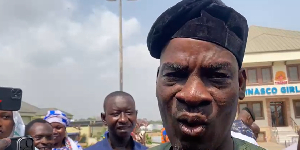
Haruna Iddrisu, the member of parliament for Tamale South, has made hints that she intends to present President John Mahama with recommendations about the contentious LGBTQ Bill.
He said he was confident the proposals would be in line with national interests to help shape the bill, but he would not provide specifics of the recommendations.
The Tamale South MP stated: "I have some ideas on the LGBTQ but I have not yet shared them with the president as to how he can re-own the bill, get national consensus around it, and be consistent with the laws of Ghana and the constitution," prior to Friday, January 10, 2025, the National Muslim Prayer and Thanksgiving at the national mosque.
"There is a method for handling it. To comment here would be to reduce it to a religious issue, but in reality, it is a national social issue that we must all work to address and resolve," he said.
Lesbian, gay, bisexual, transgender, queer, and intersex (LGBTQI) advocacy activities are to be criminalized under the contentious Human Sexual Rights and Family Values Bill. It would penalize those who sponsor or promote LGBTQI-related activities, as well as those who indirectly support them, if it were to become law.
Advocates contend that the bill is required to safeguard Ghanaian family and cultural traditions, which are allegedly being threatened by foreign philosophies.
On the other hand, opponents of the measure, including human rights organizations, denounce it as a breach of basic human rights like equality before the law, freedom of expression, and association.
However, the bill was challenged separately at the Supreme Court by broadcast journalist Richard Dela Sky and Dr Amanda Odoi, who both argued that the bill failed to meet the constitutional quorum requirements outlined in Articles 102 and 104 during the legislative process, rendering the bill’s passage unconstitutional.
Supreme Court Ruling
Because the bill had not yet been signed into law, the Supreme Court denied both petitions. Justice Lovelace Johnson explained that a law is not an enactment that is subject to judicial examination for constitutionality until it has presidential assent.
The court's stance that legislative procedures cannot be contested on constitutional grounds until they produce enforceable law is reaffirmed in this ruling.